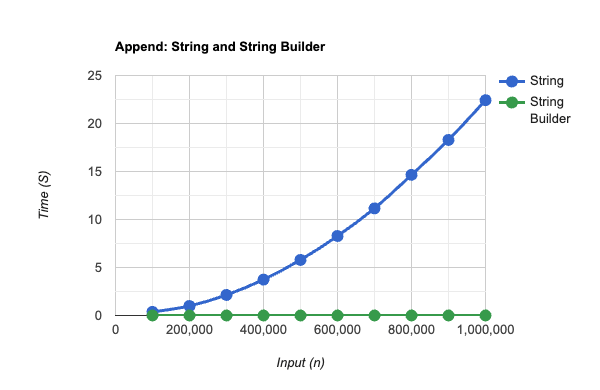An Interest In:
Web News this Week
- April 18, 2024
- April 17, 2024
- April 16, 2024
- April 15, 2024
- April 14, 2024
- April 13, 2024
- April 12, 2024
Performance Benchmarking: String and String Builder
In this article, we will do a performance benchmarking of String and StringBuilder classes in Java and discuss how to modify strings efficiently.
Strings in Java are immutable; modifying the String creates a new String object in the heap memory with the latest content, and the original String is never changed.
Immutability
String str = "You cannot modify " str = str + "me"When we append the value "me" to the str variable, a new String object gets created with the new value You cannot modify me and gets assigned to str. The original string You cannot modify does not change.
Performance
Frequently modifying strings such as using the + operator has significant performance issues, every time the + append is used, a new String object gets created and reassigned.
To modify the strings efficiently, we should consider the StringBuilder, which changes the string and does not create any extra object in the heap memory.
String Modification
Use the StringBuilder class to modify the string; this does not create a new String object but changes the existing one.
StringBuilder str = new StringBuilder("You can modify."); str.append("me");Performance Benchmarking
Consider the concatenation operation performance benchmark with the String and StringBuilder; consider the following.
- Consider 10 data points
- inputSample = [100k, 200k, 300k, 400k, 500k, 600k, 700k, 800k, 900k, 1m].
- Start with an empty string and concatenate the string "a" n time, where n = inputSample[i] i.e n = 700k.
- We want to know how long it takes to concatenate a string "a" n time for the
inputSampleusing String and StringBuilder.
String Class
public class StringBenchmark { public static void main(String[] args) { String appendCharacter = "a"; int inputSample[] = new int[]{ 100000, 200000, 300000, 400000, 500000, 600000, 700000, 800000, 900000, 1000000}; for (int n : inputSample) { double startTime = System.nanoTime(); testStringAppend(n, "", appendCharacter); double endTime = System.nanoTime(); double duration = (endTime - startTime) / 1000000000; String seconds = String.format("%.2f", duration); System.out.println("n = " + n + ": seconds: " + seconds); } } static void testStringAppend(int n, String str, String appendCharacter) { for (int i = 1; i <= n; i++) { str += appendCharacter; } }}String Class Results
n = 100000: seconds: 0.38n = 200000: seconds: 0.99n = 300000: seconds: 2.14n = 400000: seconds: 3.74n = 500000: seconds: 5.79n = 600000: seconds: 8.28n = 700000: seconds: 11.16n = 800000: seconds: 14.65n = 900000: seconds: 18.29n = 1000000: seconds: 22.43StringBuilder Class
public class StringBuilderBenchmark { public static void main(String[] args) { String appendCharacter = "a"; int inputSample[] = new int[]{ 100000, 200000, 300000, 400000, 500000, 600000, 700000, 800000, 900000, 1000000}; for(int n: inputSample){ double startTime = System.nanoTime(); testStringAppend(n, new StringBuilder(""), appendCharacter); double endTime = System.nanoTime(); double duration = (endTime - startTime)/1000000000; String seconds = String.format("%.7f", duration); System.out.println("n = "+n+": seconds: "+seconds); } } static void testStringAppend(int n, StringBuilder str, String appendCharacter){ for(int i = 1; i <= n; i++){ str.append(appendCharacter); } }}n = 100000: seconds: 0.0027n = 200000: seconds: 0.0013n = 300000: seconds: 0.0015n = 400000: seconds: 0.0015n = 500000: seconds: 0.0018n = 600000: seconds: 0.0022n = 700000: seconds: 0.0026n = 800000: seconds: 0.0029n = 900000: seconds: 0.0032n = 1000000: seconds: 0.0036Execution Time: Append
| Input (n) | String (S) | String Builder (S) |
|---|---|---|
| 100k | 0.38 | 0.0027 |
| 200k | 0.99 | 0.0013 |
| 300k | 2.14 | 0.0015 |
| 400k | 3.74 | 0.0015 |
| 500k | 5.79 | 0.0018 |
| 600k | 8.28 | 0.0022 |
| 700k | 11.16 | 0.0026 |
| 800k | 14.65 | 0.0029 |
| 900k | 18.29 | 0.0032 |
| 1m | 22.43 | 0.0036 |
Conclusion
- StringBuilder executes significantly faster than the String class when performing the
concatenationormodificationoperations. - Modifying a String creates a new String in the heap memory. To change the content of the String, we should consider the StringBuilder class.
- Any attempt to modify the String class creates a new object in the heap memory, which has significant performance drawbacks.
- StringBuilder is ideal for modifying string content; it does so without creating any extra objects in the memory.
Original Link: https://dev.to/this-is-learning/performance-benchmarking-string-and-string-builder-3bid
Dev To
 An online community for sharing and discovering great ideas, having debates, and making friends
An online community for sharing and discovering great ideas, having debates, and making friendsMore About this Source Visit Dev To


